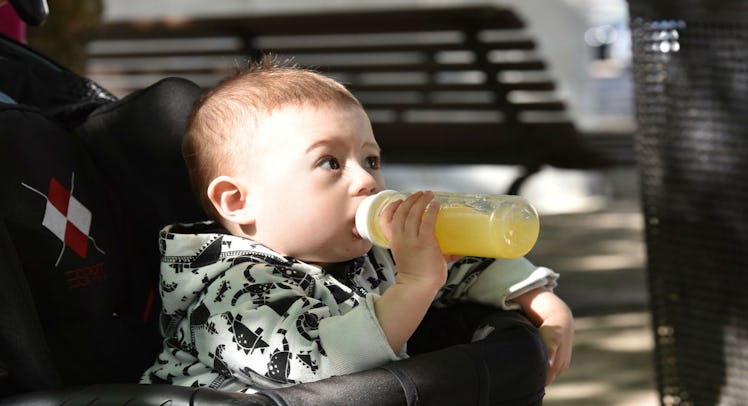Study Warns That ‘Toddler Drinks’ Could Be Harmful
According to the study, companies that manufacture toddler drinks need to be more transparent about what their health benefits really are.

A new study is warning parents about the potential dangers of so-called “Toddler Drinks” like Enfagrow and PediaSure. The study published in the journal Preventative Medicine, concludes that deceptive labeling can wrongly convince some parents that the toddler drinks have some medicinal benefit over more organic options even though this is not the case.
According to Jennifer L. Pomeranz, JD, MPH, the lead author of the study, the marketing strategy used to sell toddler drinks is such that they might actually be jeopardizing or undermining the diest of very young children. Most toddler drinks, which are often marketed as “transition formulas” or “toddler milk,” consist only of a powdered milk, additional sweetener, and vegetable oil. There are few health benefits to be derived from those ingredients and the study also notes that toddler drinks contain less protein and more sodium than regular whole milk. According to Pomeranz “there is no evidence that they [toddler drinks] are nutritionally superior to healthy food and whole milk for toddlers.” Beyond this, The World Health Organization has gone as far as to call toddler drinks “unsuitable” as well as superfluous.
What’s worse, is that many of these toddler drinks are sold right alongside regular baby formula. Many companies who manufacture baby formula also use similar imagery, packaging, and language to sell their toddler drinks. This leads parents who buy them to believe that the FDA has screened the former just as thoroughly as the latter when that simply isn’t true. It is, however, consistent with findings that, despite being subject to very strict labeling and marketing laws, formulas are often marketed in such a way that parents become convinced that they offer benefits that breastfeeding does not. This is not true. Breast milk just doesn’t come with a label.
Toddler drinks are broadly understood to be a means of keeping picky eaters healthy. What the companies that make them don’t explain is that picky eating is a learned character trait and that if parents try to expose their children to a wide variety of foodstuff and beverages, their kids are likely to have more diverse palates and not need sugary quasi-milk.
The study ultimately recommended that the FDA crack down on the marketing practices that prevent parents and caretakers from making the most informed choices possible when it comes to their children’s health. That could result in companies that manufacture toddler drinks being forced to differentiate them from regular formula and transition formula, or having to recommend that parents consult with an actual doctor before using letting their toddlers consume these products.
This article was originally published on